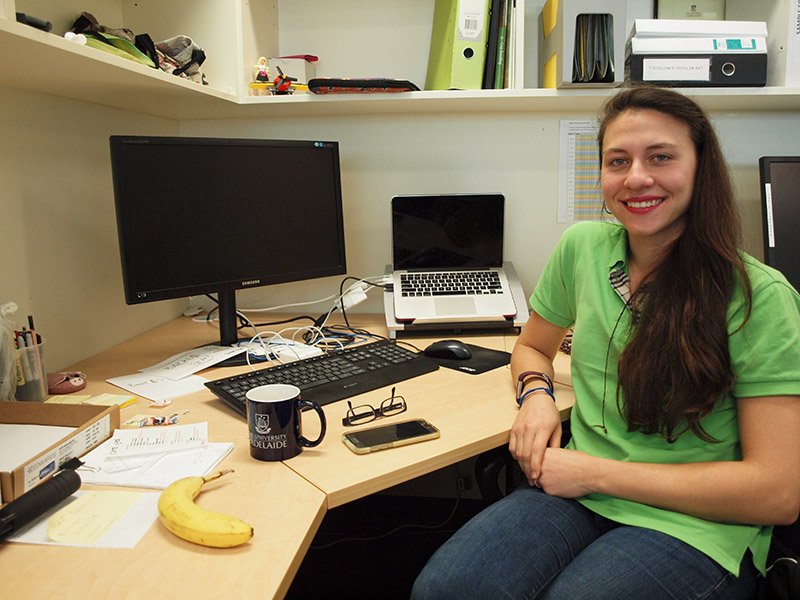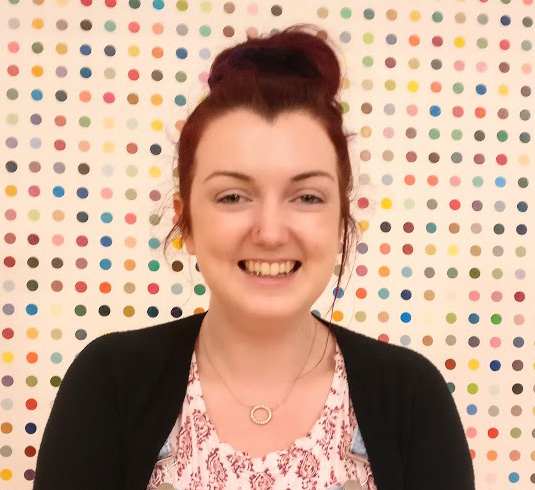There are roughly 1,500 people on the Waite campus – from students to professors, technicians to human resource managers, and even volunteers. They work and study across a range of campus partner organisations.
This series of articles will introduce you to some members of the Waite community – who they are, what they do, and why it matters!
Interview by Emma Aspin
Caterina Selva, PhD Candidate
I grew up in Novate Milanese, a town on the outskirts of Milan. I did my studies in the city of Milan itself, completing a Bachelor in Biology, then a Masters in Molecular Biology at the University of Milan.
After that, I knew I wanted to pursue a research career and do a PhD… but I also knew I wanted to travel. I’d had enough of Milan, and I needed a change.
It took a while to find the right opportunity. I’ve always found it hard to make decisions – even when choosing my studies I was initially undecided between medicine, psychiatry, biology and chemistry!
When I applied to undertake a PhD at the University of Adelaide, I looked at my husband, Matteo, and said “You realise that if they accept us, we’re going to have to move half way across the world”, to which he replied “Yeah… but they’ll never accept us”… now it’s been three years since we moved here!
I’m almost at the end of my PhD and have just one more experiment to finish before I start writing up my thesis. My project is about investigating three barley mutants that are involved in flower development. I was drawn to this project in particular as it was a good progression from my Master’s degree, which looked at flower development in Arabidopsis. I find it elegant how plants function!
I’m trying to figure out which genes are responsible for some mutant phenotypes. So far, I’ve managed to identify 2 out of the 3 genes, and I’m close to getting to the third one! But what’s more interesting is that I think I have figured out how the mutants are linked together in a single model for flower development.

By understanding how the flower develops, you have the tools to be able to modify it. That way, we can make hybrid plants that produce more yield for growers, which in turn can be used to feed more people. For some plants it’s quite easy to make hybrids, whereas for others it’s not. In some cases you need to modify the flower to facilitate this process, and that’s done using the knowledge people like myself and others have developed.
Curiosity is what motivates me the most. Molecular genetics is like having a very tiny puzzle in front of you that you have to solve using giant tweezers. Sometimes, the solution can be right in front of you, but you don’t know the process of what it took to get there. It’s a thrilling and sometimes frustrating concept. For example, my mutants cause the barley flowers to have an altered phenotype, so I know they must be involved in flower development – now I just have to decipher which piece of the puzzle those mutants are.

I feel that I’ve grown a lot since I started my PhD, both scientifically but also personally. I think it’s the people I’ve met in Adelaide, the colleagues I’ve worked with, but also the fact I moved halfway around the world to continue my education and basically do what I like to do. And of course moving to a new city, let alone a new country, has its own challenges and obstacles… facing these has made me grow.
I met my husband Matteo during my Master’s degree in Milan, he worked in the lab next to mine. Without him, I probably wouldn’t have had the courage to travel this far. He’s not only my partner, but someone who has the same background as me, which really helps when you take such a big leap. Matteo works as a post-doc on the Waite campus at CSIRO (Commonwealth Scientific and Industrial Research Organisation) on a project called ‘Capturing Heterosis’ using cowpeas. We came from the same city, and now we’ve both ended up working on the same campus in Australia!
Matteo warned me that my PhD was going to be a roller coaster, and that it wasn’t always going to be fun and easy… I decided to ignore him, at first! I thought, “I can do this!”. He turned out to be right – it has had its ups and downs – but I’m still here, I’m still riding the roller coaster, and I’m so close to the end!
If I defied anyone’s expectations so far, they would be my own! Like our favourite scientist, Professor Richard Feynman, once said – “I find myself trying to imagine all kinds of things, all of the time, and I get a kick out of it… like a runner gets a kick out of sweating”. When you are researching science you are creating new knowledge, and what’s not fun about that?
Australia would be a great place to settle, but I wouldn’t mind moving back to Europe eventually. I think that after a while I feel like changing the environment, which is exactly how I felt after my Masters; I’d had my fill of that place and needed to change. Change for some is scary, but for me it’s exciting!
 Emma Aspin is a second-year PhD student from the UK with a passion for science communication. Upon arrival to the Waite, Emma was astounded by the diversity of workers, students and scientists across the campus and knew that there were some great stories to be told! As well as having some fun, the column is a great opportunity to discuss your work and have a chance to reach the public or even future collaborators.
Emma Aspin is a second-year PhD student from the UK with a passion for science communication. Upon arrival to the Waite, Emma was astounded by the diversity of workers, students and scientists across the campus and knew that there were some great stories to be told! As well as having some fun, the column is a great opportunity to discuss your work and have a chance to reach the public or even future collaborators.
If you would like to be featured in the column and have time to chat to Emma sometime, drop her an email: emma.aspin@adelaide.edu.au.
